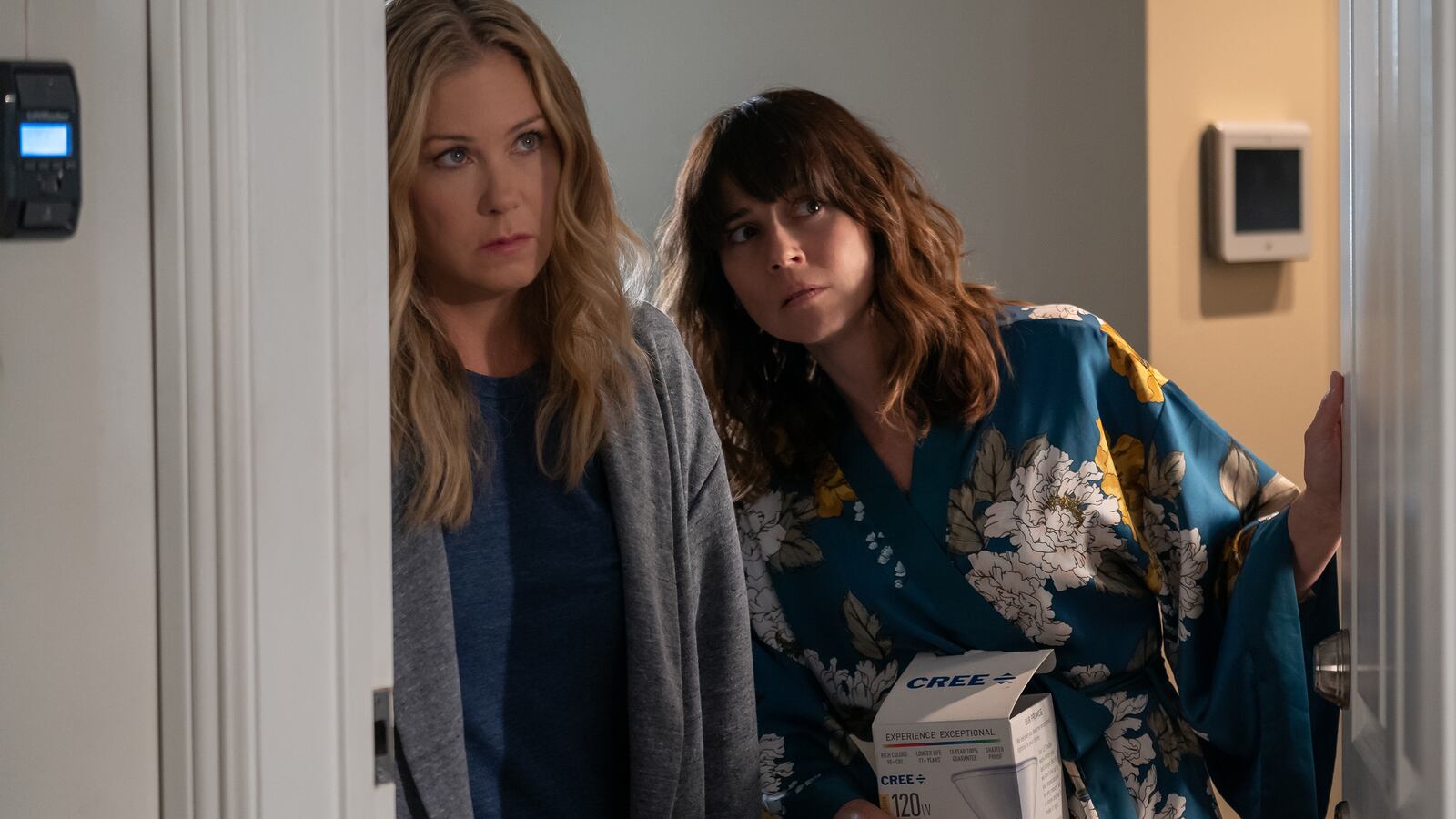This post contains spoilers for Dead to Me Season 2.
Maybe it’s the surreality of, well, everything lately—or maybe it’s just aged like the fine wines all of its characters toss back by the bottle. Whatever the reason, Dead to Me Season 2 hits even better than Season 1—fighting off a sophomore slump with a fresh batch of twists, dramatic ironies, and, most importantly, some more Christina Applegate angsting out to metal. Perhaps this season’s smartest move, however, is a trope pulled straight out of Soapy Dramas 101: Bringing James Marsden back to play his own twin.
Series creator Liz Feldman was sending the usual thank-you notes back and forth with cast and crew after Season 1 wrapped when she received a particularly amusing message from Marsden.
“He sends me this just lovely email saying, essentially, sort of jokingly like, ‘What’s the chance that Steve could survive a traumatic head injury?’” Feldman told The Daily Beast with a laugh during a recent interview. “I thought, God, if there was a way to bring him back, I would just love to keep working with him. And so I got this idea in my head. It just made me laugh.”
In Dead to Me’s premiere season, Marsden plays attorney Steve Wood—abusive ex-fiancé to Linda Cardellini’s Judy Hale, who was last seen floating dead in Jen’s (Applegate’s) pool during the Season 1 finale. Season 2 explores, among other things, exactly how that happened.
As Feldman discussed possibilities for Season 2 over coffee with her friend, Dead to Me writer Kelly Hutchinson, she mentioned the email from Marsden—“and we just literally looked at each other and at the same exact time we were like, ‘Twins?!’”
In a twist on the usual “evil twin” gambit, Marsden’s Ben is a kind-hearted chiropractor—and Marsden’s sweet off-screen persona certainly doesn’t hurt in selling it. “James physically brings such a light to the set every time he’s there,” Feldman said. “He is like a ray of rainbow sunshine. Whatever your ideal of like what a wonderful man is, he is that.”
Yes, Feldman knows this is a very trope-y thing to do; that’s kind of the point. Dead to Me Season 2 continues the show’s established tradition of blending TV genres to reflect the often absurd ways in which real life unfolds. At times that can include some daytime TV tropes—executed, always, with a sly wink.
Feldman has written about how her real-life fertility struggles influenced Dead to Me’s ethos; in a column for Glamour last spring, she wrote, “I have learned to look at the darkest moments in life and see the comic aura around them. It’s become more than a coping mechanism; it’s my ethos. And now it’s a TV show.”
Now, amid a devastating pandemic, that ethos can be almost as comforting as it is entertaining—like an acknowledgement of just how fucked up life can truly get. “But even before this, that was just my experience of life,” Feldman said. “Like, one day you could be on top of the world. You know, later that day you can find out, you know, your best friend passed away.”
“When you're in grief there’s a certain filter that you experience life through,” Feldman added. “It’s hypersensitive and it’s vulnerable, and I think that is something that is woven into the fabric of the show.”
Marsden, Cardellini, and Applegate were all friends before working together on the show, which can make the set something of a mutual admiration society.
“I was just talking to Christina yesterday, and she was just telling me how good she thinks Linda is,” Feldman said. “And I was talking to Linda, and Linda was saying how good she thinks Christina is.”
In Season 2, Feldman wanted delve deeper into cynical Jen and doe-eyed Judy’s friendship, peeling back a few layers to discover whether that bond “could transcend the toxicity from which it came.” But she also wanted to expand on a few smaller characters from Season 1, including Diana Maria Riva’s detective Ana Perez. Turns out, Perez has a pretty complicated situation at home; she’s still living with her ex Michelle (Natalie Morales), who (naturally) happens to start dating Judy.
“I had always in my mind thought of [Perez] as an LGBTQ person,” Feldman said. “It was just never said in the first season because there was no reason to say it; you know, it just didn't come up.”
Judy, Feldman added, was inspired by an amalgamation of her friends. It felt natural to introduce her queerness without much fanfare: “Like, that's just who she is. She's a walking, beating heart.”
And then, there’s the show’s “fourth lead” character, as Feldman puts it—all of that wine. When asked how many bottles of prop wine the series goes through to film even one episode, Feldman admitted she couldn’t even say. And then came perhaps the biggest twist of all: “This is the truth,” Feldman said. “The truth is, I don’t even drink wine.”






